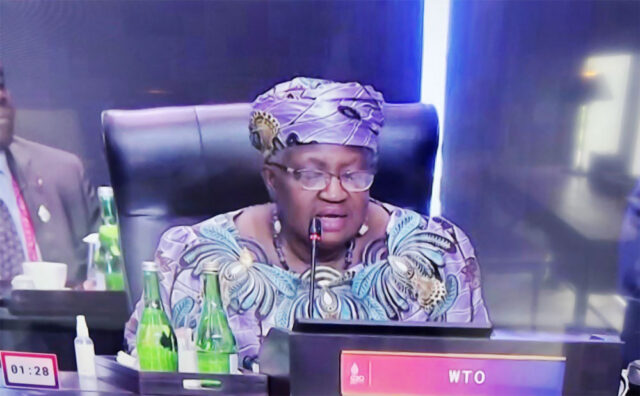- Group of 20 and WTO members urged to avoid imposing trade limits that can further aggravate the global economic outlook
- WTO Director-General Ngozi Okonjo-Iweala made the appeal as the 28th WTO Trade Monitoring Report shows G20 members continued to adopt trade-restrictive measures
- The WTO says as of mid-October 2022, WTO members still had in place 52 export hurdles on food, feed and fertilizers
World Trade Organization Director-General Ngozi Okonjo-Iweala has called on all Group of 20 and WTO member countries to refrain from adopting new trade-restrictive measures that can further aggravate the global economic outlook.
Okonjo-Iweala made the appeal on November 14 as a WTO report, issued in time for the G20 summit in Indonesia, said members of the economic group had introduced export curbs quickly, particularly on food and fertilizer, between mid-May and mid-October 2022 in view of the Ukraine war and the food security crisis.
The 28th WTO Trade Monitoring Report on G20 trade measures also indicated that supply chains have thus far proved to be resilient despite the war, continuing impacts of the COVID-19 pandemic, record-high inflation in many countries, and the effects of monetary tightening by central banks. Specific industries and regions have been differently impacted.
As of mid-October 2022, WTO members still had in place 52 export restrictions on food, feed and fertilizers, in addition to 27 export restrictions on products essential to combat COVID-19. Of these, 44% of the export restrictions on food, feed and fertilizers, and 63% of the pandemic-related export restrictions, were maintained by G20 economies, the report said.
“While some trade-restrictive measures have been lifted by G20 countries, the report indicates that the trend has been going in the wrong direction. Export restrictions contribute to shortages, price volatility, and uncertainty,” Okonjo-Iweala said.
“G20 economies must build on their collective pledges from the 12th Ministerial Conference and demonstrate leadership to keep markets open and predictable, so that food and fertilizer in particular can flow to where they are needed.”
Okonjo-Iweala is attending the G20 Summit in Bali that closes November 16.
The report said that overall, the pace of implementation of new export restrictions by WTO members has increased since 2020, first in the context of the pandemic and subsequently with the war in Ukraine and the food crisis. Some of these export restrictions have been gradually lifted, but several still remain in place.
During the review period, G20 economies introduced 66 new trade-facilitating measures covering trade worth US$451.8 billion and 47 trade-restrictive measures on goods with a trade coverage of US$160.1 billion. These measures were not related to the pandemic.
At the same time, the accumulated stockpile of G20 import restrictions continued to grow. By mid-October, 11.6% of G20 imports were affected by trade curbs implemented since 2009 and still in force.
There were 17 initiations of trade remedy investigations by G20 economies during the review period, sharply down from a peak in 2020 that was the highest since the beginning of the monitoring exercise in 2009, WTO said.
Anti-dumping measures continued to be the most frequent trade remedy action in terms of initiations and terminations.
Similarly, the implementation of new COVID-related trade measures by G20 economies slowed over mid-May to mid-October this year, with four new such measures recorded on goods and one on services. The number of new COVID-19-related support measures to mitigate the social and economic impacts of the pandemic also fell sharply during the period.
Since the beginning of the pandemic, 201 COVID trade and trade-related measures in goods were implemented by G20 economies. Of these, 61% were trade facilitating, while the remaining 39% could be considered trade-restrictive.
The report said G20 economies also continued to phase out pandemic-related import and export measures. By mid-October this year, 77% of export restrictions had been repealed, leaving 17 restrictions in place. Although the number of the pandemic-related trade restrictions in place decreased, their trade coverage remained significant at US$122 billion.
WTO trade monitoring reports have been prepared by the WTO Secretariat since 2009. G20 members are: Argentina; Australia; Brazil; Canada; China; the European Union; France; Germany; India; Indonesia; Italy; Japan; the Republic of Korea; Mexico; the Russian Federation; Saudi Arabia; South Africa; Türkiye; the United Kingdom; and the United States.









